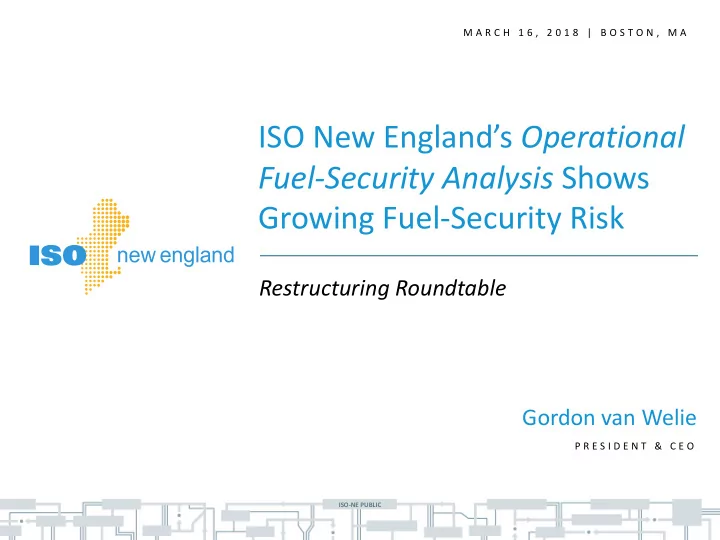

M A R C H 1 6 , 2 0 1 8 | B O S T O N , M A ISO New England’s Operational Fuel-Security Analysis Shows Growing Fuel-Security Risk Restructuring Roundtable Gordon van Welie P R E S I D E N T & C E O ISO-NE PUBLIC
KEY MESSAGES ISO’s Operational Fuel-Security Analysis shows the region trending in • a negative direction with regard to fuel-security risk Operating experience during recent cold weather period reinforces • fuel-security analysis ISO’s resilience filing with the Federal Energy Regulatory Commission • (FERC) focuses on New England’s unique fuel-security risks FERC approves ISO’s Competitive Auctions with Sponsored Policy • Resources (CASPR) proposal for integrating markets and public policy ISO-NE PUBLIC ISO-NE PUBLIC 2 ISO-NE INTERNAL USE
Study Seeks to Understand the Future Effects of Trends Already Affecting Power System Operations The analysis examines 23 possible fuel-mix • combinations during the 2024-2025 winter, and quantifies each case’s fuel-security risk – i.e., the number and duration of energy shortfalls that would require implementation of emergency procedures to maintain reliability The study assumed no additional natural gas pipeline capacity to • serve generators would be added during the study timeframe The study seeks to illustrate the range of potential risks that could • confront the power system if fuel and energy were constrained during the winter – The scenarios, in aggregate, show the region trending in a negative direction with regard to fuel-security risk ISO-NE PUBLIC 3
Study Modeled Wide Range of Resource Combinations Considering Five Key Fuel Variables 1. Retirements of coal- and oil-fired generators (the study assumes that New England will have no coal-fired power plants in winter 2024/2025) 2. Imports of electricity over transmission lines from New York and Canada 3. Oil tank inventories (i.e., how often on-site oil tanks at dual-fuel power plants are filled throughout the winter) 4. Level of liquefied natural gas (LNG) injections into the region’s natural gas delivery and storage infrastructure 5. Level of renewable resources on the system ISO-NE PUBLIC 4
Study Suggests Six Major Conclusions 1. Outages : The region is vulnerable to the season-long outage of any of several major energy facilities. 2. Key Dependencies : As we retire more resources, reliability becomes heavily dependent on LNG and electricity imports; more dual-fuel capability is also a key reliability factor. 3. Logistics : Timely availability of fuel is critical, highlighting the importance of fuel-delivery logistics. 4. Risk : All but four of 23 scenarios result in load shedding, indicating a trend towards increased fuel-security risk. 5. Renewables : More renewables can help lessen fuel-security risk but are likely to drive oil-and coal-fired generator retirements, requiring high LNG imports to counteract the loss of stored fuels. 6. Positive Outcomes : Higher levels of LNG, imports, and renewables can minimize system stress and maintain reliability; delivery assurances for LNG and imports, as well as transmission expansion, will be needed. ISO-NE PUBLIC 5
ISO New England Will Continue to Discuss the Results of the Study with Stakeholders • As the region’s grid operator responsible for reliability , the ISO must independently assess the level of risk to reliable power system operations • A key question to be addressed will be the level of fuel-security risk that the ISO, the region, policymakers, and regulators are willing to tolerate • Discussions with stakeholders on potential solutions to address the region’s fuel-security risks are targeted to begin later in 2018 ISO-NE PUBLIC 6
ISO’s Response to FERC Order on Resilience Focuses on New England’s Unique Fuel-Security Risks On March 9, 2018 , ISO filed a response to FERC’s January 8 order • directing ISOs and RTOs to answer a series of questions on the resilience of their respective regions ISO’s Operational Fuel-Security Analysis and the additional • experience gained during the recent cold weather period provided the basis for its response During the recent cold weather period, stretching from December 26 • to January 8, gas and oil fuel price inversion led to oil being in economic merit and base loaded, leading to rapid depletion of the region’s oil supply – Logistical concerns surrounding fuel deliveries – Emissions limitations at generating facilities ISO-NE PUBLIC 7
Frigid Cold Drove Up Regional Demand for Natural Gas This led to spikes in natural gas prices, which then led to spikes in wholesale electricity prices; with natural gas at a premium, oil generation became economic Cold Weather Period Prices for Natural Gas and Wholesale Electricity Underlying natural gas data furnished by: ISO-NE PUBLIC 8
Generators Burned 2 Million Barrels of Oil in 2 Weeks That’s more than twice the amount of oil used in all of 2016 Barrels of Oil 2,000,000 1,000,000 0 2016 Cold Weather Period (12/26/17 – 1/9/18) ISO-NE PUBLIC 9
FERC Approves ISO’s Near-Term Proposal for Integrating Markets and Public Policy • Competitive Auctions with Sponsored Policy Resources (CASPR) seeks to: – Accommodate sponsored policy resources into the Forward Capacity Market over time, and – Preserve competitively based capacity pricing for other resources to ensure resource adequacy State procurement efforts for clean energy may attract • resources that seek to participate in FCA #13 with plans for commercial operation in the 2022-2023 timeframe – FCA #13 will be held in February 2019 – Timely approval prior to the de-list bid window for FCA #13 allows resources to participate in the first substitution auction ISO-NE PUBLIC 10
Closing Thoughts… • We now have clarity on a near-term solution for integrating state-sponsored resources into the capacity market • We see significant challenges ahead for fuel security • There will be a cost associated with alleviating fuel constraints and a cost associated with inaction – The ISO can take action through its market design and tariff to procure ‘insurance’ to alleviate, but not eliminate, fuel-security risk – The states can weigh the costs and environmental trade-offs and take action to shape infrastructure solutions that significantly mitigate fuel-security risk ISO-NE PUBLIC 11
ISO-NE PUBLIC 12
Recommend
More recommend